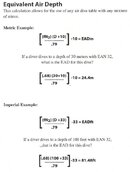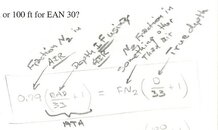I read this a lot on scubaboard and it truly has me baffled. I know not all people go into OW courses as engineers with multiple high level math and physics courses in their educational background. I know not all people are truly comfortable in the water before they start OW but I don't understand what is so overwhelming about OW courses that this mantra keeps getting pushed here.
OW classes used to teach a whole lot more theory and prior to that basically taught no theory (if my understanding of diving history is accurate). Yes, the "full course" used to be significantly longer than the "typical" modern weekend/4 day courses but what's so overwhelming about understanding gas compression at an intuitive level (balloons make excellent visual aids) even if you don't truly understand gas theory? At least the course materials used in my PADI OW and my TDI Nitrox classes were low enough level that you could get through them with not much more than an elementary education in math. Same goes for the actual physics concepts.
I understand that in-water skills can be difficult and get where that might be overwhelming, but I think I can come up with 12 things that are really new material for anyone who's graduated high school and most of those are in-water skills.
So what exactly is so overwhelming?
OW classes used to teach a whole lot more theory and prior to that basically taught no theory (if my understanding of diving history is accurate). Yes, the "full course" used to be significantly longer than the "typical" modern weekend/4 day courses but what's so overwhelming about understanding gas compression at an intuitive level (balloons make excellent visual aids) even if you don't truly understand gas theory? At least the course materials used in my PADI OW and my TDI Nitrox classes were low enough level that you could get through them with not much more than an elementary education in math. Same goes for the actual physics concepts.
I understand that in-water skills can be difficult and get where that might be overwhelming, but I think I can come up with 12 things that are really new material for anyone who's graduated high school and most of those are in-water skills.
So what exactly is so overwhelming?






